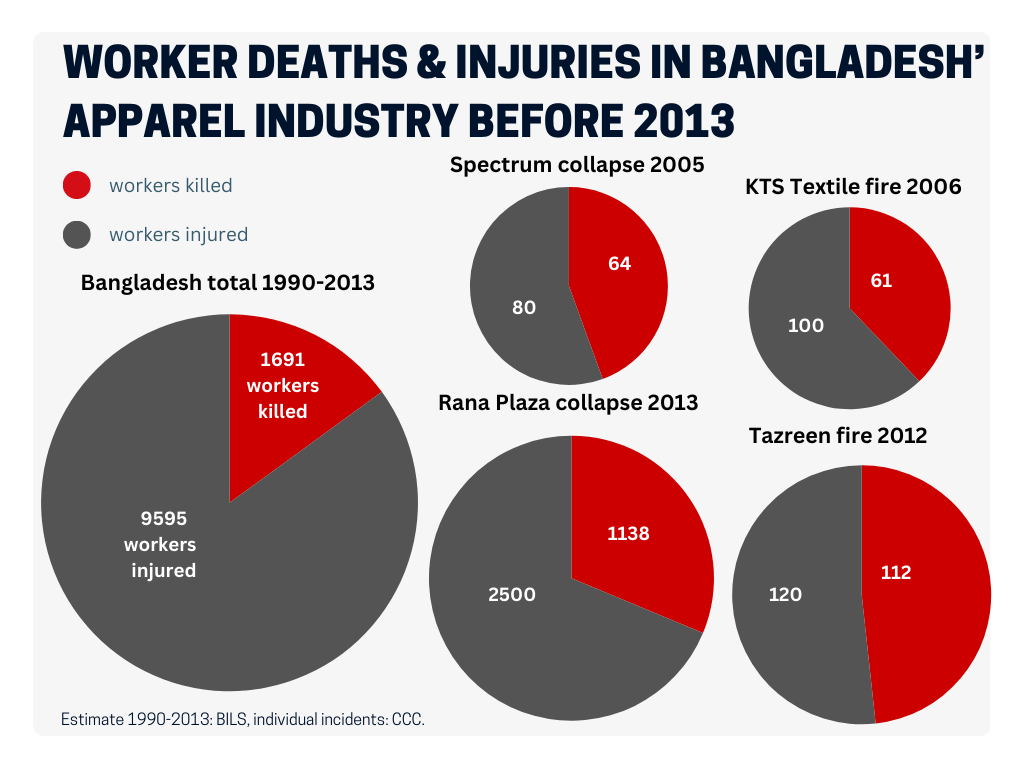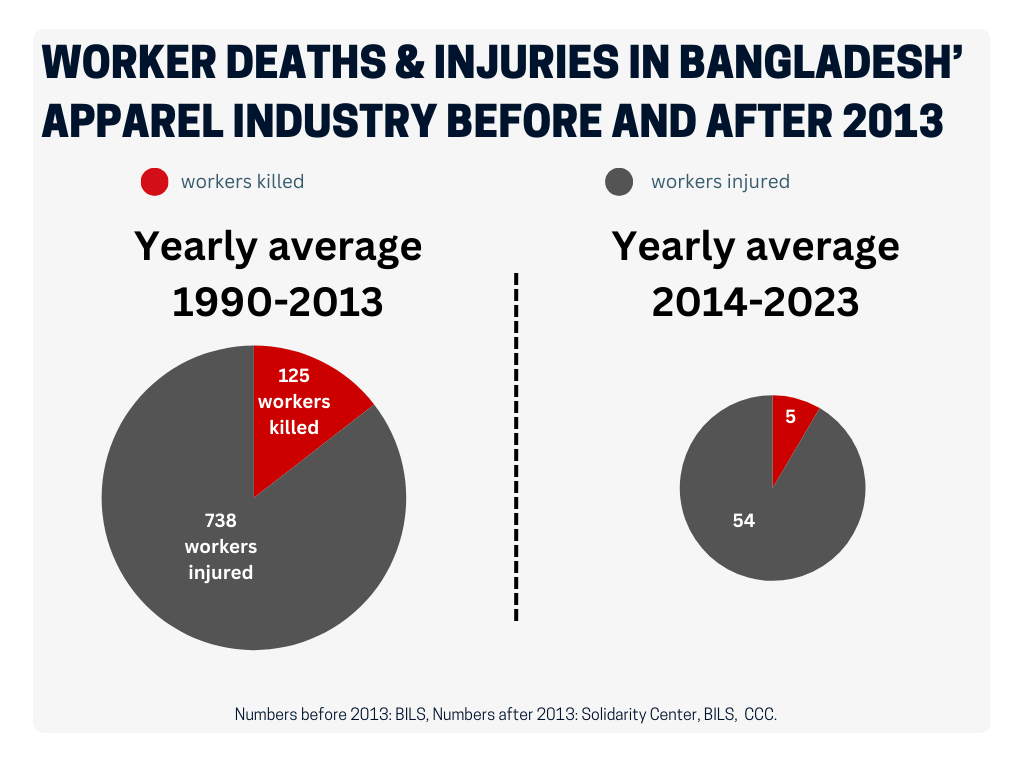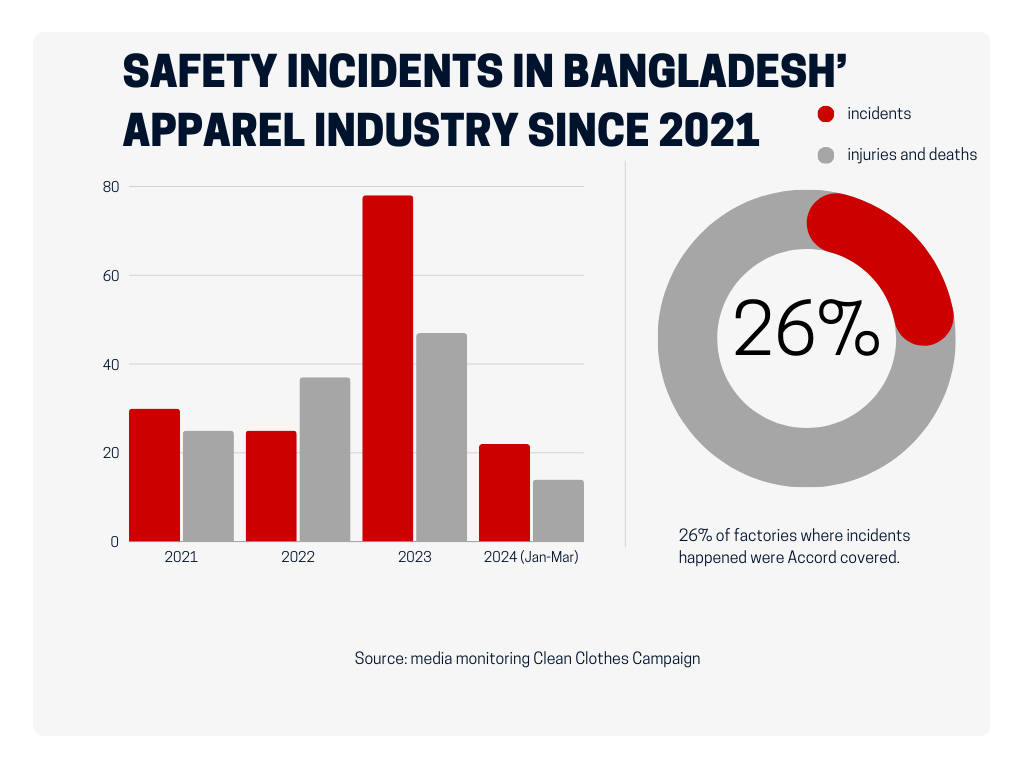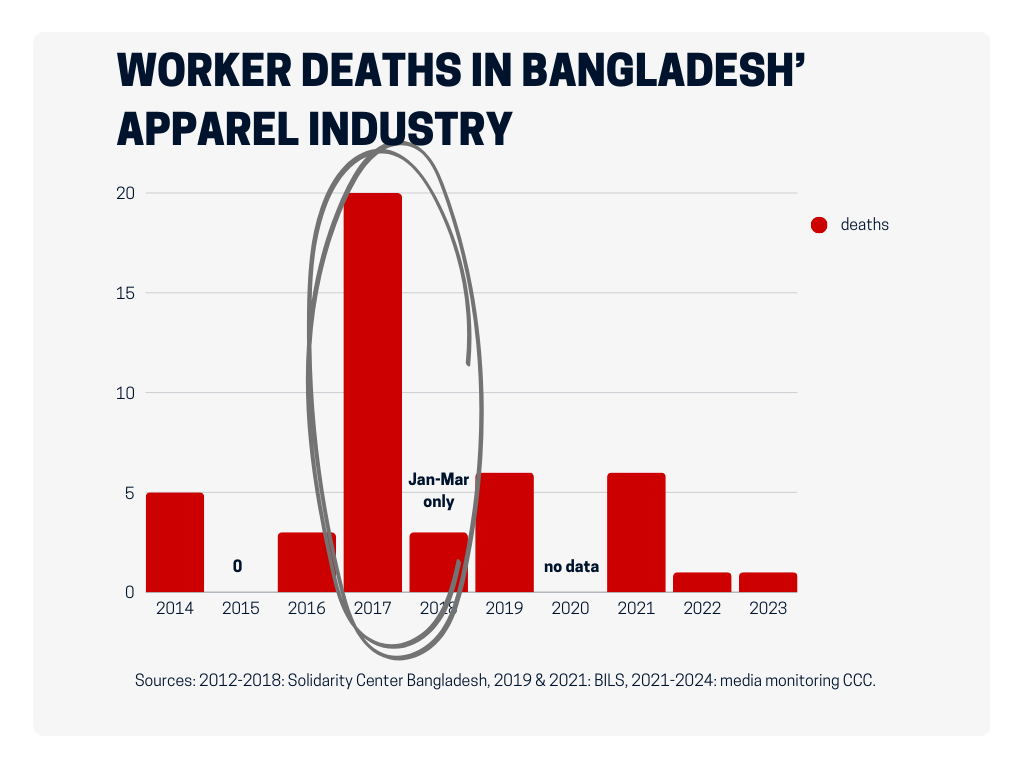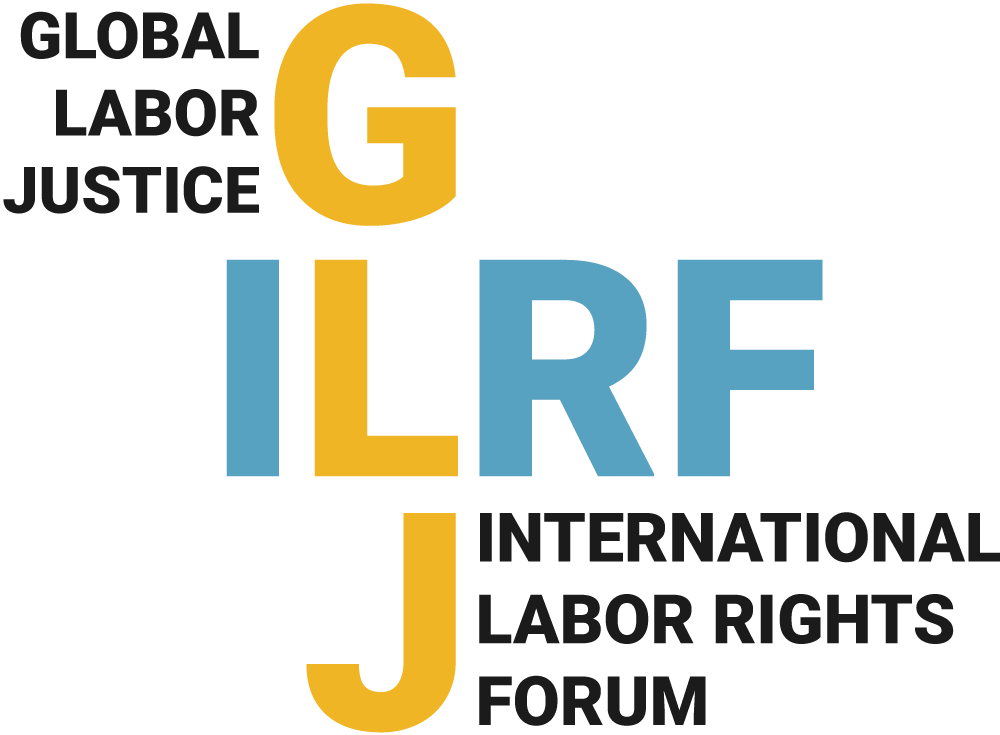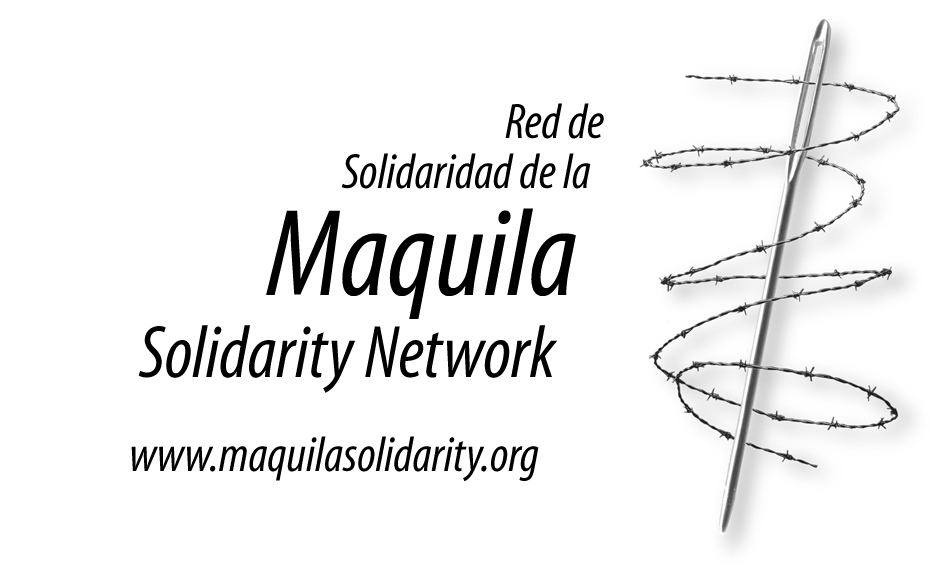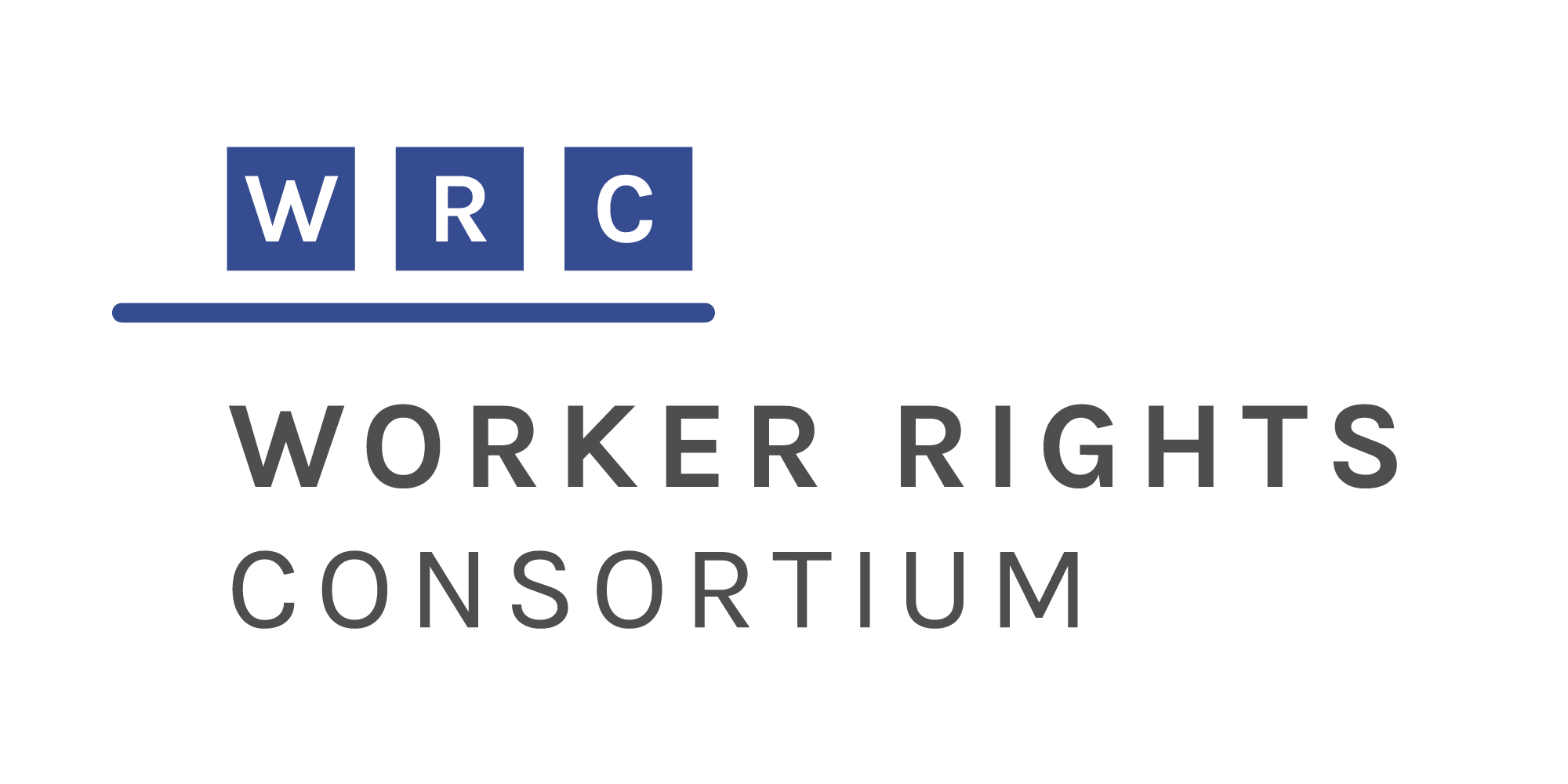Keep all workers safe
The collapse of the Rana Plaza building in Bangladesh in 2013 led to the death of over 1,100 workers. This tragedy caused a large amount of brands to agree to the independent safety inspections and enforceable safeguards of the the binding safety programme that would become known as the Accord. Its inspections and trainings have been of immense importance to ensure workers in Bangladesh and Pakistan do not have to risk their lives going to work. Yet many workers across the world continue to risk their lives in unsafe buildings, because the brands sourcing from their factories have not signed the Accord, or the Accord does not cover their factories. It is time to ensure safe factories are no privilege, but that every worker can be sure the building they work in is safe.
Before and after
Before 2013, garment factories in Bangladesh were notoriously unsafe. Workers' deaths and injuries in the garment industry and related industries were frequent and the death toll was high. Although brands knew about these unacceptable risks to the workers producing their clothes, it took unions and labour rights organisations, including the Clean Clothes Campaign over a decade to make brands listen. By 2012 there was a binding agreement with two brands' signatures on it, but the agreement would only take effect after four brands signed. Despite years of intensive dialogue and public pressure, all other brands waited until after the worst happened: the Rana Plaza collapse finally woke them up. The Accord on Fire and Building Safety in Bangladesh, based on the binding agreement on the table, was signed by over 200 brands.
The Accord's independent inspections, its worker trainings and worker complaint mechanism made factories safer for over 2 million workers in 1600 factories. Key is its legally enforceable nature, which enables unions to sue brands that are not keeping to their commitments in court.
Locks were removed from doors and fire-rated doors installed. Structurally unsafe buildings were evacuated until they were declared safe again. Factories' faulty electrical systems, a frequent cause of fires, were checked and made safe.
As a result, the amount deaths and injuries went down drastically, but many workers still are not safe at work: not in Bangladesh and even less so around the world. Not all workers are covered by the Accord. Find out what needs to happen to make sure that no worker around the world has to fear for their life upon entering the factory they work in.
1. All brands must sign the Accord
Over 200 brands have signed the Accord, but there are still brands who prefer to leave their workers at the mercy of the corporate-led systems that failed to protect the workers in the Rana Plaza factories and other major factory incidents. Have a look at our brand tracker to see which brands are still dodging responsibility and how you can take action to convince them.
2. The Accord must quickly expand to other countries
The Accord started in Bangladesh in 2013, after which it took over ten years of campaigning by unionists in Pakistan and Bangladesh and inernational allies to expand the Accord to Pakistan in 2023. The current International Accord is committed to expanding to other countries, and it should do so quickly, because workers around the world continue to get injured and die in the workplace, as our tracker below shows.
Currently, workers in India, Turkey, Vietnam, Egypt, Morocco and elsewhere have no independent complaint mechanism to turn to, nor are their factories regularly checked in independent inspections. Expansion of the Accord to their countries will make factories safer for all workers in supply chains of Accord signatory brands.
These numbers are based on media monitoring and therefore are just the tip of the iceberg, because many incidents never make it to the media.
3. The Accord must also cover workers deeper in the supply chain
Currently, signatory brands to the Accord in Bangladesh are only obliged to inform the Accord about the Ready-Made-Garment factories in their supply chain under the Accord. They can decide to also add the factories that produce home textile of accessories. This means that only the facilities that make the end product that the brand eventually sells, are covered. But before a t-shirt is cut, stitched and trimmed, a lot of workers have handled the fabric, and also the end product itself is finished and packaged by yet other workers.
Millions of workers toil in spinning mills, dyeing facilities, and other related industries without independent factory inspections and worker safety trainings, even if they are working in the supply chain of an Accord signatory brand. Only if the mill, dyeing or washing unit or related industry facility is located in the same building or on the same compound as the RMG facility covered by the Accord it is automatically inspected by Accord engineers. Between 2021 and 2025, Clean Clothes Campaign recorded around 50 incidents in mills, warehouses, and beyond CMT factories in Bangladesh. This is a conservative estimate. It is high time that the Accord's scope is expanded to make sure that signatory brands are obliged to bring factories deeper in their supply chain under the purview of the Accord.
A gas pipe explosion - an example
On 8 February 2024, 14 workers were injured in a gas pipeline explosion in the Crony Group, which includes Crony Apparels Limited - an Accord covered facility producing for Accord-signatory Matalan and non-signatory Tom Tailor, and Crony Textile Unit instead: a sister company across the street - deeper in the supply chain and therefore not covered. This means that the facility was not checked by independent inspectors beforehand, that workers have no avenue to complain if they see safety violations and that the facility will not receive a post-incident inspection to indicate what needs to remediate to ensure that the results of the blast do not endanger more workers and that such an incident can never happen again. It is high time to bring facilities deeper in the supply chain under the purview of the Accord.
4. Workers in Bangladesh must be able to continue to trust the system
In 2020, the implementation of the Accord on the ground in Bangladesh was taken over by the Ready-Made-Garment Sustainability Council (RSC), consisting of Accord signatory brands, unions, and factory owners. Since then labour rights advocates have voiced concerns about the diminished power of labour voices and growing influence of employers on the Accord operations in the country, including on the level of transparency exercised, the measures taken against factories that do not carry out the safety remediations as ordered after the inspections, and the complaint mechanism. A 2025 analysis by several of the Accord’s witness signatories showed several instances where undue employer influences delayed or even interfered with the work of the Accord.
Incidents and injuries among workers have been on the rise in Bangladesh since 2021 and while most of them occur in factories that are not covered by the Accord, it is important to remain vigilant to ensure that workers in Bangladesh can trust the local operations going forward.
One of the issues that was slowed down by employer interference and needed considerable pressure to speed up again were boiler inspections. When the Accord first started in 2013, boiler inspections were not included in its mandate and left to the authorities in Bangladesh. The relevant department was however chronically understaffed, which meant that workers continued to be at risk of boiler explosions. This became painfully clear in 2017 when a boiler exploded in the Accord-covered Multifabs factory, killing 13 workers - making it de deadliest incident in the Bangladesh garment industry of the past decade.
After a pilot in 2018 it took considerable pressure to finally overcome employer attempts to slow down the work. Only in 2024 enough inspectors were hired to really pick up the pace.
Other incidents where employers have acted in their own interest instead in that of the safety programme on whose board they are represented keep on piling up. When in October 2025, after a long-running pilot and consultation process, the board of the RSC agreed to expand the mandate of the Accord complaint mechanism to topics beyond Occupational Health and Safety, the employer organisations soon backtracked on the decision which they in the meeting had supported. Faced with fears in their membership that this expanded mechanism would increase costs and workload for them, they stated that they had not been consulted, even though their agreement in the meeting was recorded. It is not befitting of an organisation on the board of a safety programme to put their own business interests ahead of the goals of the programme itself.
Accord signatories entrust (and fund) the RSC to implement the Accord agreement. The developments of this month again demonstrate that it is absolutely essential for the credibility of the programme to rethink and reset the governance structure of the RSC, ensuring that factory owners do not exercise governance power over the day-to-day operations of the safety programme.
5. The Accord should proactively monitor and remediate climate related health and safety risks
The next crisis is here, and it is affecting workers' health and safety already. Heat in factories has considerable influence on workers' well-being and should be mitigated by ventilation, cooling, access to water and longer breaks. Risks of extreme weather and flooding also pose new challenges on building safety. While currently workers in Accord covered factories and file complaints regarding these issues, we believe the Accord should proactively inspect factories on these issues and add climate preparedness to their remediations. Read more in our paper about workers' rights and heat or find our more in the report by Climate Rights International about heat and labour rights in Bangladesh.
Colofon
1. Statistics
Solidarity Center (2012-2018)
Clean Clothes Campaign (2021-2024 - unpublished media monitoring)
2. Incident tracker
Methodology: Unless otherwise noted, information on the safety incidents is from news reports. Brands were identified primarily through import records and brand disclosure. Because some apparel brands and most textile companies refuse to reveal their supplier factories, some of the factories where we were not able to identify buyers may also be supplying international brands and retailers. We welcome you to submit suggested additions to this timeline, or corrections, to info@cleanclothes.org; please provide information sources when doing so.
Recommended resources:
- Text of the International Accord for Health and Safety in the Garment and Textile Industry agreement
- Text of the Pakistan Accord on Health & Safety in the Textile & Garment Industry
- Signatories to the International Accord and the Pakistan Accord
- Overview of brands that have not yet signed the Accord
- Witness signatory statement on the start of the RSC in 2020

